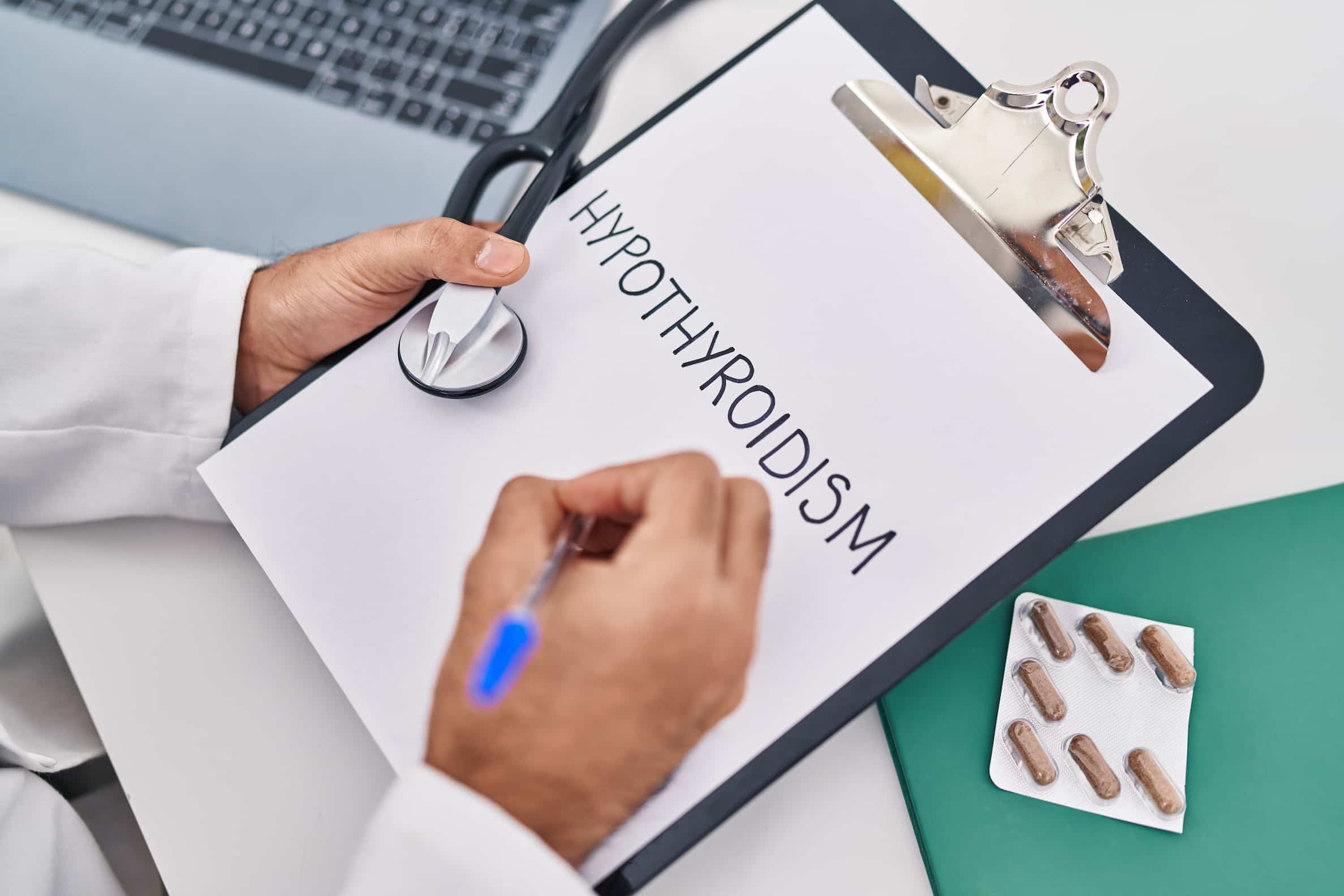
Signs Your Thyroid Isn’t Working Right
Thyroid problems are relatively common and can affect people of all ages and genders. The thyroid is a small gland located in the neck that produces hormones that regulate the body’s metabolism. When the thyroid produces too much or too little of these hormones, it can lead to a range of health problems. In this article, we will discuss 20 signs of thyroid problems that you should be aware of.
What Is a Thyroid Problem?
A thyroid problem refers to any condition that affects the function of the thyroid gland. There are two main types of thyroid problems: hypothyroidism and hyperthyroidism. Hypothyroidism occurs when the thyroid gland doesn’t produce enough thyroid hormones. This can cause a range of symptoms, including fatigue, weight gain, constipation, and depression. It is most commonly caused by an autoimmune disorder called Hashimoto’s thyroiditis.
Hyperthyroidism occurs when the thyroid gland produces too much thyroid hormone. This can cause symptoms such as weight loss, rapid heart rate, anxiety, and difficulty sleeping. The most common cause of hyperthyroidism is an autoimmune disorder called Graves’ disease.
20 Signs of Thyroid Problems
Thyroid problems can cause a range of symptoms that can significantly impact a person’s quality of life. If you experience any of the signs mentioned above, it is essential to talk to your healthcare provider to determine the underlying cause and receive appropriate treatment.
Fatigue: People with thyroid problems may experience fatigue, even after getting enough sleep.
Weight Changes: Thyroid problems can cause weight gain or weight loss, depending on whether the condition is hypothyroidism or hyperthyroidism.
Hair Loss: Thyroid problems can lead to hair loss, which can be patchy or diffuse.
Changes in Skin: Changes in skin, such as dryness or a yellowish tint, can be a sign of a thyroid problem.
Constipation: Hypothyroidism can cause constipation, as the thyroid hormone plays a role in regulating bowel movements.
Depression: Depression is a common symptom of hypothyroidism, as thyroid hormones can affect the levels of neurotransmitters in the brain.
Anxiety: Hyperthyroidism can cause anxiety, as the excess thyroid hormone can affect the nervous system.
Heart Palpitations: Hyperthyroidism can cause heart palpitations, as the excess thyroid hormone can increase the heart rate.
Muscle Weakness: Thyroid problems can lead to muscle weakness, making it difficult to perform daily activities.
Menstrual Changes: Women with thyroid problems may experience changes in their menstrual cycle, including heavy or irregular periods.
Infertility: Thyroid problems can affect fertility, as the thyroid hormone plays a role in regulating ovulation.
Intolerance to Cold: People with hypothyroidism may feel cold all the time, as the thyroid hormone helps regulate body temperature.
Heat Intolerance: People with hyperthyroidism may feel hot all the time, as the excess thyroid hormone can increase body temperature.
Swelling in the Neck: A swollen neck can be a sign of an enlarged thyroid gland, also known as a goiter.
Hoarse Voice: A hoarse voice can be a sign of an enlarged thyroid gland pressing against the vocal cords.
Tingling or Numbness in Hands or Feet: Thyroid problems can lead to nerve damage, causing tingling or numbness in the hands or feet.
Tremors: Hyperthyroidism can cause tremors, or shaking, as the excess thyroid hormone affects the nervous system.
Changes in Vision: Hyperthyroidism can cause changes in vision, such as double vision or eye protrusion.
Memory Problems: Thyroid problems can affect memory and cognitive function, particularly in older adults.
High Cholesterol: Thyroid problems can lead to high cholesterol levels, increasing the risk of heart disease.
Thyroid problems can be diagnosed through a blood test that measures the levels of thyroid hormones and thyroid-stimulating hormone (TSH) in the body. Depending on the diagnosis, treatment options may include medications, surgery, or radioactive iodine therapy.
It’s worth noting that some thyroid problems, such as Hashimoto’s thyroiditis, can be autoimmune disorders. In these cases, a comprehensive approach that includes lifestyle changes, such as a healthy diet, exercise, and stress management, may be beneficial in managing the condition.

The Importance of Diagnosing Thyroid Problems Early
Diagnosing thyroid problems early is crucial because untreated thyroid problems can cause a range of symptoms and potentially lead to serious complications. The thyroid gland plays a vital role in regulating the body’s metabolism, and any dysfunction can significantly impact a person’s overall health and quality of life.
One of the most common thyroid problems is hypothyroidism, which occurs when the thyroid gland does not produce enough thyroid hormones. If left untreated, hypothyroidism can cause a range of symptoms, including fatigue, weight gain, depression, and constipation. Over time, untreated hypothyroidism can lead to more serious complications, such as an enlarged thyroid gland (goiter), high cholesterol levels, heart disease, and even myxedema coma, a life-threatening condition that can cause confusion, decreased breathing, and low body temperature.
Hyperthyroidism, which occurs when the thyroid gland produces too much thyroid hormone, can also cause a range of symptoms, including weight loss, increased appetite, anxiety, and tremors. Left untreated, hyperthyroidism can lead to serious complications, such as atrial fibrillation (an irregular heartbeat), osteoporosis, and thyroid storm, a rare but life-threatening condition that can cause fever, confusion, and heart failure.
Additionally, some thyroid problems, such as thyroid cancer, may not cause any noticeable symptoms in the early stages. Regular thyroid screenings, including blood tests and ultrasounds, can help detect any potential problems early when they are most treatable.
The Study of Thyroid Problem Signs
A recent study published in the Journal of Endocrinology conducted a comprehensive analysis of the prevalence of thyroid disorders across different age groups and identified common signs and symptoms associated with thyroid dysfunction. The study highlighted that fatigue and unexplained weight changes were among the most prevalent indicators among individuals with thyroid problems. These findings underscore the importance of recognizing these early signs and seeking medical evaluation when they manifest, as early detection and intervention can significantly improve the management of thyroid conditions.
What Can Be Done to Prevent Thyroid Problems?
While it may not be possible to completely prevent thyroid problems, there are steps you can take to support thyroid health and potentially reduce your risk of developing thyroid problems. Eating a healthy, balanced diet that is rich in fruits, vegetables, whole grains, lean proteins, and healthy fats can support overall health, including thyroid function. Additionally, avoiding iodine deficiency is crucial, as iodine is an essential nutrient that is necessary for thyroid hormone production. Including iodine-rich foods in your diet, such as seaweed, fish, dairy products, and iodized salt, can help ensure adequate iodine intake.
Chronic stress can disrupt the body’s hormonal balance, including thyroid hormones. Practicing stress-management techniques, such as meditation, yoga, or deep breathing exercises, can help support thyroid health. Regular physical activity can also support overall health and help maintain a healthy weight, which can also support thyroid function. Getting enough sleep is essential for overall health, including thyroid function, and aiming for 7-8 hours of sleep per night is recommended.
It’s also important to avoid smoking, as smoking has been linked to an increased risk of thyroid problems, among other health problems. Additionally, being aware of your family history is crucial, as some thyroid problems, such as autoimmune thyroid disease, can have a genetic component. If you have a family history of thyroid problems, it’s important to talk to your healthcare provider about your risk and any necessary screenings.
While these steps may help support thyroid health, they may not necessarily prevent thyroid problems from occurring. Regular check-ups with your healthcare provider, including thyroid function tests, can help detect any problems early and ensure timely treatment. If you experience any symptoms of thyroid problems, it’s essential to talk to your healthcare provider to determine the underlying cause and receive appropriate treatment. With proper diagnosis and management, people with thyroid problems can lead healthy, fulfilling lives.




